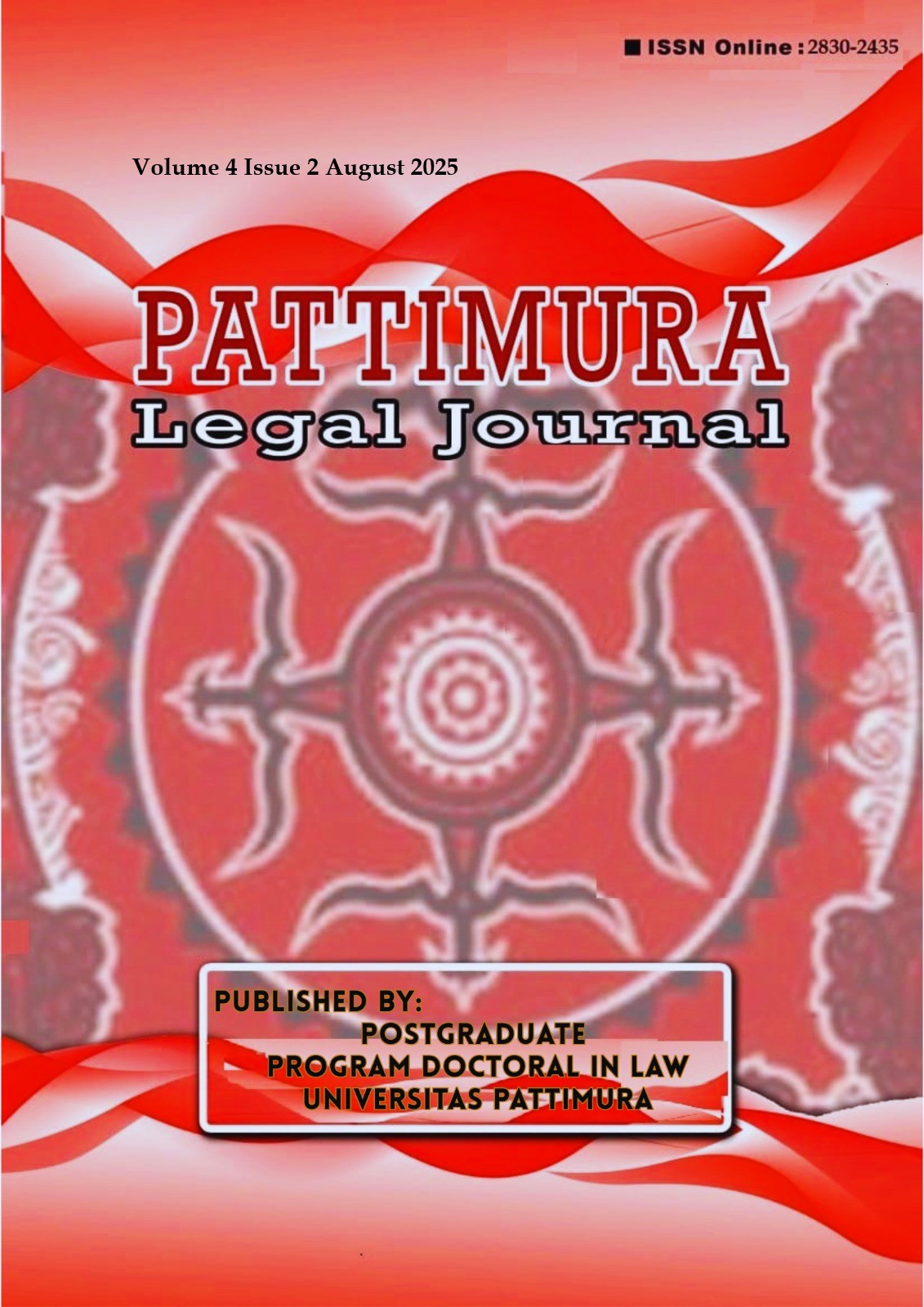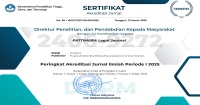The Legality of Abortion Without Spousal Consent in Islamic Jurisprudence
Abstract
Introduction: The issue of abortion without spousal consent remains a contentious topic in Islamic jurisprudence, reflecting broader debates on women's autonomy and reproductive rights within marriage. Islamic family law traditionally emphasizes mutual agreement between spouses in major decisions, including those related to pregnancy. However, the question of whether a woman can independently decide to terminate a pregnancy without her husband’s approval remains subject to differing interpretations among scholars and legal schools.
Purposes of the Research: This study aims to investigate the legality and ethical implications of unilateral abortion by women under Islamic jurisprudence, focusing particularly on the role and requirement of spousal consent.
Methods of the Research: The research adopts a normative legal methodology, conducting a textual and thematic analysis of primary Islamic legal sources, including the Qur’an, prophetic traditions (Hadith), and the classical juristic rulings (fiqh), alongside contemporary scholarly opinions and legal frameworks in Muslim-majority countries.
Results Main Findings of the Research: The findings reveal that while most Islamic legal traditions require spousal consultation or consent, certain conditions such as threats to the mother’s life or health may justify a woman's independent decision to abort. The study underscores a spectrum of legal opinions, from those mandating strict spousal consent to those permitting unilateral decisions based on the principle of avoiding harm (darar), and suggests that a balance can be achieved through a maqasid al-shari'ah (objectives of Islamic law) approach that prioritizes the well-being of the mother while respecting the marital partnership.
Downloads
References
Afroo, Fakhriyah Annisa, Nenan Julir, and Rema Syelvita. “Attending Walimatul ‘Ursy : Pregnant Women Due To Adultery Perspectif Islamic Law.” Jurnal Kawakib 5, no. 1 (2024): 35–42. https://doi.org/https://doi.org/10.24036/kwkib.v5i1.222.
Al-Refa’e, Ma’moon. “Abortion in Islamic Criminal Legislation: Its Pillars and Punishment (Comparative Fiqhi Study).” An-Najah University Journal for Research - B (Humanities) 25, no. 5 (2011): 1397–1434. https://doi.org/10.35552/0247-025-005-009.
Ali, Tazeen M. “Embodied Experiences and Islamic Feminist Ethics: Gender Equality and Abortion in US Muslim Women’s Interpretive Communities.” Journal of Feminist Studies in Religion 40, no. 2 (2024): 23–40. https://doi.org/10.2979/jfs.00019.
Anwar, Aep Saepul, and Imam Sofi. “Konsep Dan Isu Gender Dalam Perspektif Islam: Studi Telaah Kedudukan Laki-Laki Dan Wanita Dalam Pandangan Islam.” Jurnal Paris Langkis 5, no. 1 (2024): 151–61. https://doi.org/https://doi.org/10.37304/paris.v5i1.15494.
Azizah, Nur, Mhd Syahnan, and Budi Sastra Panjaitan. “The Legality of Abortion by Medical Personnel for Rape Victims in Indonesia: A Perspective from Maqashid Sharia by Al-Syatibi and Al-Tufi.” Madania: Jurnal Kajian Keislaman 28, no. 1 (2024): 35–44. https://doi.org/http://dx.doi.org/10.29300/madania.v28i1.3847.
Bagheri, Alireza, Lelia Afshar, Mohamed A Shahin, Majdah Zawawi, Mohammed Albar, and Sahin Aksoy. “Abortion in Different Islamic Jurisprudence: Case and Commentaries.” Asian Bioethics Review 3, no. 4 (2011). https://muse.jhu.edu/article/461976.
Elmali-Karakaya, Ayse. “Interfaith Marriage in Islam: Classical Islamic Resources and Contemporary Debates on Muslim Women’s Interfaith Marriages.” Religions 13, no. 8 (2022): 726. https://doi.org/https://doi.org/10.3390/rel13080726.
Faraz, Sajida, Shams Ul Hussain Zaheer, and Naila Rafique. “Analytical Study of The Legitimacy of Abortion In Islamic Jurisprudence.” Sociology & Cultural Research Review 3, no. 01 (2025): 982–1003.
Fatimah, Utari Dewi. “Perlindungan Hukum Hak Kesehatan Reproduksi Perempuan.” Jurnal Hukum Sasana 5, no. 2 (2019): 212–33. https://doi.org/https://doi.org/10.31599/sasana.v5i2.101.
Fauzi, Muhammad Ali, Heppi Septiani, and Zainatus Sholehah. “Harmonisasi Hukum Adat Dengan Hukum Islam.” COMSERVA : Jurnal Penelitian Dan Pengabdian Masyarakat, (2023): https://doi.org/10.59141/comserva.v3i07.993.
Fauziyah, Ririn, Agus Sholahudin Shidiq, and Burhanatut Dyana. “Maslahah Sebagai Kerangka Berfikir Dan Tujuan Hukum Islam.” Asasi: Journal of Islamic Family Law 1, no. 2 (2021): 159–78. https://doi.org/https://doi.org/10.36420/asasi.v2i2.
Fitri, Al, and M SH. “Pembaruan Hukum Keluarga Di Indonesia Melalui Kompilasi Hukum Islam.” Mahkamah Agung RI 1 (2020): 1–21.
Hamdani, Muhammad Faisal. “Abortion in Islam: A Fiqh Examination of Medical and Social Indications.” Journal of Ecohumanism 3, no. 3 (2024): 1111–24. https://doi.org/https://doi.org/10.62754/joe.v3i3.3446.
Hegab, Moustafa H. “Abortion: Medical and Moral Aspects in Islamic Perspectives,” 177–85. Leiden, The Netherlands: Brill, 2013. https://doi.org/https://doi.org/10.1163/9789401209830_012.
Henry, Pamela J, Russell L Steiger, and Andrea K Bellovary. “The Contribution of Gender Equality to the Coexistence of Progressive Abortion and Sexual Orientation Laws.” Sex Roles 86 (2022): 263–81. https://api.semanticscholar.org/CorpusID:246024017.
Herzog, Marc. “Islam, Democracy and Dialogue in Turkey: Deliberation in Divided Societies.” Australian Journal of International Affairs 66, no. 3 (2012): 404–6. https://doi.org/10.1080/10357718.2012.681469.
Hudiyani, Zulfa. “Diskursus Aborsi Dalam Perspektif Fikih Klasik Dan Kontemporer.” Al-Ahwal Al-Syakhsiyyah: Jurnal Hukum Keluarga Dan Peradilan Islam 2, no. 1 (2021): 43–61. https://doi.org/https://doi.org/10.15575/as.v2i1.12172.
Jaffal, Zeyad, Shawabkeh Faisal, and Ali Hadi and Al Obeidi. “Toward Constructive Harmonisation of Islamic Family Law and CEDAW: A Study on the UAE’s Reservation to CEDAW Article 16 and Equal Rights to Marriage and Family Relations.” Australian Journal of Human Rights 28, no. 1 (2022): 139–62. https://doi.org/10.1080/1323238X.2022.2122689.
Jalili, Ismail, Helmi Syaifuddin, Fadillah Ulfa, Wery Gusmansyah, and Muntaha Artalim Zaim. “The Legitimacy of Abortion: A Socio-Legal Analysis of Islamic Jurisprudence and Indonesian Law.” De Jure: Jurnal Hukum Dan Syar’iah 16 (2024): 382–405. https://doi.org/https://doi.org/10.18860/j-fsh.v16i2.29077.
Kalam, Mir Azad, Santosh Kumar Sharma, Saswata Ghosh, and Subho Roy. “Linkages between Consanguinity, Pregnancy Outcomes and Offspring Mortality in Twenty-First Century India.” Scientific Reports 14, no. 1 (2024): 22522. https://doi.org/10.1038/s41598-024-69151-7.
Khdir, Rebaz Rasul, Kamal Mohammed Abubaker, and Baqer Jawad Shamsulddin. “Abortion between the Right to Life of Fetus and The Right to Privacy of Woman An Analytical and Comparative Study between Law and Islamic Sharī’ah.” Zanco Journal of Humanity Sciences 29, no. 1 (2025): 138–64. https://doi.org/https://doi.org/10.21271/zjhs.29.1.7.
Laksmi, Dyah Ayu Vijaya. “The Principle of Justice in Islamic and Civil Inheritance Law: Legal Disparities, Dispute Resolution, and Harmonization.” Al-Adalah: Jurnal Hukum Dan Politik Islam 10, no. 1 (2025): 122–33. https://doi.org/10.30863/ajmpi.v10i1.8352.
Lestari, Ahdiana Yuni, Agesti Andriani, Dakum Dakum, and Setiyawan Gunardi. “Abortion in the Perspective of Islamic Law and Health Law.” Kosmik Hukum 24, no. 3 SE-ARTICLE (2024): 166–77. https://doi.org/10.30595/kosmikhukum.v24i3.22798.
Maimanah, Maimanah, M Fahmi Al-Amruzy, Arni Arni, and Siti Faridah. “Delay in the Division of Inheritance: A Theoretical Review within Legal System Framework in Indonesia.” Syariah: Jurnal Hukum Dan Pemikiran 24, no. 1 (2024): 241–57. https://doi.org/https://doi.org/10.18592/sjhp.v24i1.12916.
Moradinazar, Mehdi, Reza Rostami, Nazila Armaghan, Mohammad Shakiba, Amirreza Rai, Sogand Abbasi Azizi, and Ebrahim Shakiba. “Epidemiological Features of Spontaneous Abortion in the North Africa and the Middle East from 1990 to 2019: Results from the Global Burden of Disease Study 2019.” Journal of Family & Reproductive Health 16, no. 3 (2022): 183. https://doi.org/10.18502/jfrh.v16i3.10579.
Murni, Dewi. “Kesehatan Reproduksi Menurut AlQuran Surat Al Baqarah/2 Ayat 222-223.” Jurnal Ulunnuha 8, no. 2 (2019): 219–29. https://doi.org/https://doi.org/10.15548/ju.v8i2.1254.
Musfiroh, Mayadina Rohmi, Fatma Mohamed Mansour Saqr, and Alfa Syahriar. “The Urgency of Maslahah in the Formulation of Fatwa and Legislation in Indonesia: An Analytical Study.” Ulul Albab: Jurnal Studi Dan Penelitian Hukum Islam 8, no. 1 (2024): https://doi.org/10.30659/jua.v8i1.37242.
Nasir, Mohamad Abdun. “The Majelis Ulama’s Fatwā on Abortion in Contemporary Indonesia.” The Muslim World 101, no. 1 (2011): 33–52. https://doi.org/10.1111/j.1478-1913.2010.01341.x.
Nikolić, Oliver. “The Cairo Declaration on Human Rights in Islam.” Strani Pravni Zivot 64, no. 3 (2020): 89–97. https://doi.org/https://doi.org/10.5937/spz64-28285.
Qurratul-Ain-Munir-Minhas, and Samia Maqbool Niazi. “Abortion and Rape Laws in Pakistan.” Islamic Studies 59, no. 3 (2020): 359–76. https://doi.org/https://doi.org/10.52541/isiri.v59i3.1067.
Rahmah, Siti Nur, Anwar Hafidzi, and Arie Sulistyoko. “Hukum Aborsi Menurut Imam Al-Ghazali Dan Yusuf Al-Qardhawi.” Journal Of Islamic And Law Studies 2, no. 1 (2018). https://doi.org/https://doi.org/10.18592/jils.v2i1.4560.
Rahmi, Aulia. “Mashlahah Dalam Fatwa MUI No. 4 Tahun 2005 Tentang Aborsi Kasus Pemerkosaan.” Universitas Islam Negeri Sultan Syarif Kasim Riau, 2020.
Ralph, Lauren J, and Lee A Hasselbacher. “Adolescents and Abortion Restrictions: Disproportionate Burdens and Critical Warnings.” The Journal of Adolescent Health : Official Publication of the Society for Adolescent Medicine 73 2 (2023): 221–23. https://doi.org/10.1016/j.jadohealth.2023.05.002.
Romadhon, Ahnaf Nur Fauzan, and Tajul Arifin. “Aborsi Dalam Perspektif Hadits Riwayat Ahmad Bin Hanbal No 18989.” MUSHAF JOURNAL: Jurnal Ilmu Al Quran Dan Hadis 3, no. 2 (2023): 205–17. https://doi.org/10.54443/mushaf.v3i2.122.
Sakira, Asra. “Aborsi Dan Hak Kesehatan, Reproduksi Perempuan Dalam Hukum Islam Dan Hukum Negara.” Al-Ubudiyah: Jurnal Pendidikan Dan Studi Islam 3, no. 2 (2022): 11–27. https://doi.org/https://doi.org/10.55623/au.v3i2.120.
Shapiro, Gilla K. “Abortion Law in Muslim-Majority Countries: An Overview of the Islamic Discourse with Policy Implications.” Health Policy and Planning 29, no. 4 (2014): 483–494. https://doi.org/https://doi.org/10.1093/heapol/czt040.
Srirahma, Srirahma, and Sri Nanang Meiske Kamba. “Effectiveness of Article 53 On Marrying Pregnant Women In Compilation Of Islamic Law.” Estudiante Law Journal 4, no. 3 (2022): 739–58. https://doi.org/https://doi.org/10.33756/eslaj.v4i2.18362.
Tannenbaum, Daniel I. “The Effect of Child Support on Selection into Marriage and Fertility.” Journal of Labor Economics 38, no. 2 (2019): 611–52. https://doi.org/10.1086/705928.
Ünal, Merve. “Hafsa Kesgin. İslam Hukukunda Kürtaj. İstanbul: Kitâbi Yayınları, 2018. TT - Hafsa Kesgin. Abortion in Islamic Law. İstanbul: Kitâbi Publications, 2018.” İlahiyat Tetkikleri Dergisi, no. 58 (2022): 116–18. https://doi.org/10.5152/ilted.2022.2264154.
Utami, Miftahul. “Criminal Action of Abortion Rape Health Perspective Legal and Islamic Law.” Requisitoire Law Enforcement 14, no. 2 (2023): 46–51. https://doi.org/https://doi.org/10.59651/relae.v14i2.81.
Wahyudi. “Hukum Adat, Hukum Islam Dan Hukum Barat.” In Hukum Islam, 155–69. Padang: Hei Publishing Indonesia, 2024.
———. Hukum Kesehatan: Suatu Tinjauan Aspek Yuridis. Sleman, Yogyakarta: Penamuda Media, 2024.
Copyright (c) 2025 Wahyudi Wahyudi, Usep Saepullah, Ibtisam Ilyana Ilias (Author)

This work is licensed under a Creative Commons Attribution-NonCommercial 4.0 International License.
Authors who publish their manuscripts in this Journal agree to the following conditions:
- The copyright in each article belongs to the author, as well as the right to patent.
- Authors are able to enter into separate, additional contractual arrangements for the non-exclusive distribution of the journal's published version of the work (e.g., post it to an institutional repository or publish it in a book), with an acknowledgment of its initial publication in this journal.
- Authors are permitted and encouraged to post their work online (e.g., in institutional repositories or on their website) prior to and during the submission process, as it can lead to productive exchanges, as well as earlier and greater citation of published work.
- Authors have the right to self-archiving of the article (Author Self-Archiving Policy)






















